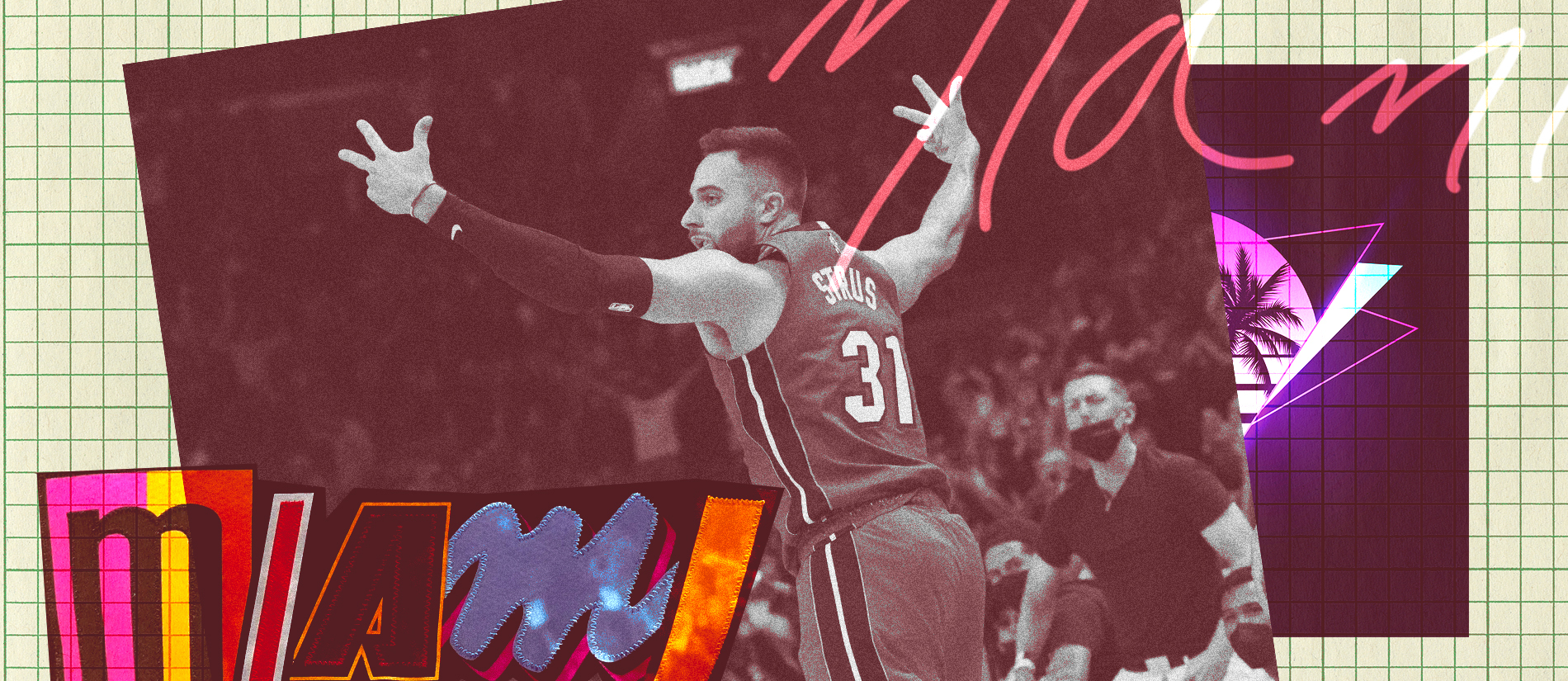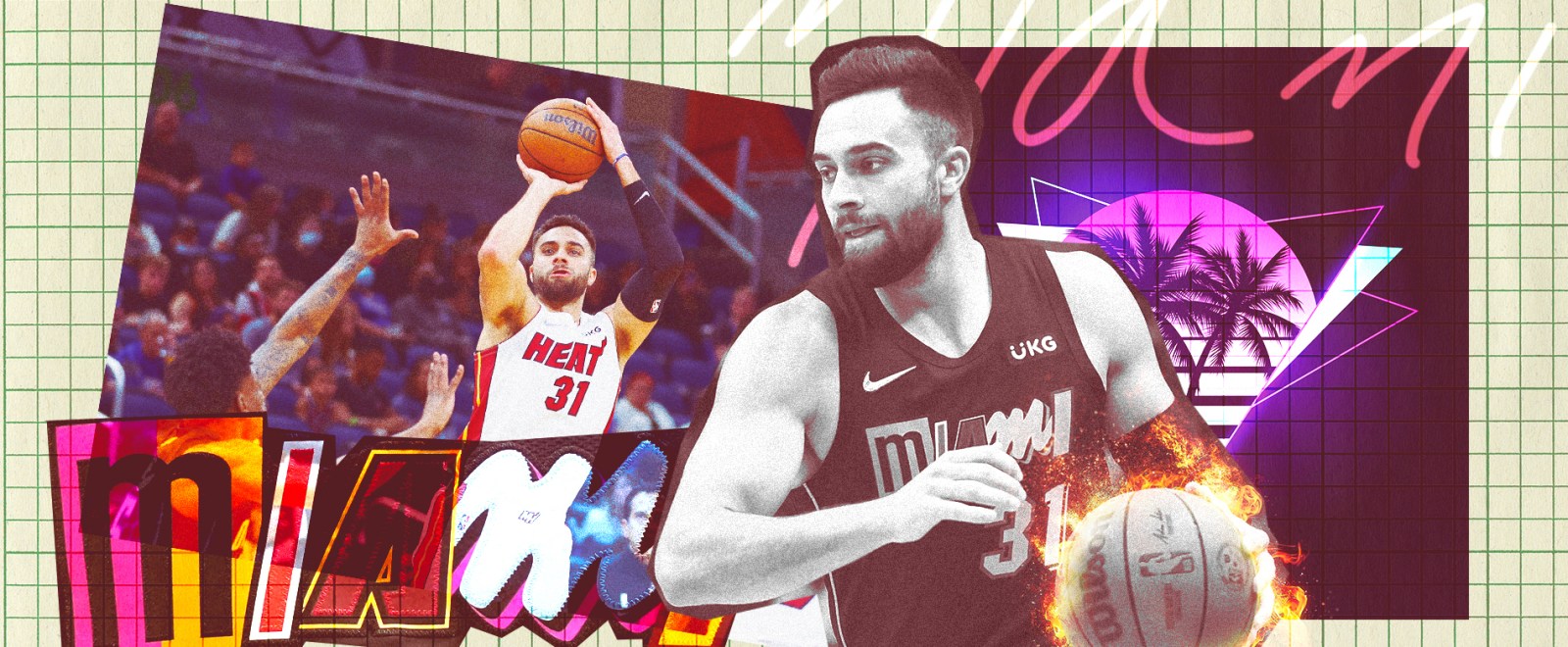On Dec. 17, 2021, the Miami Heat picked up a 115-105 win over the Orlando Magic thanks in part to an unlikely hero: Max Strus. Miami seemed snakebitten earlier this season, ravaged by a collection of injuries and bouts of COVID, and space became available for lesser-heralded players to win them basketball games.
Strus, who had flashed his ability to score a handful of times during his tenure with the Heat, came off the bench and scored 32 points while connecting on eight of his 11 attempts from three. The next four games were much of the same — Strus racked up a few starts and kept scoring, and despite having his own stint in the NBA’s health and safety protocols, made his most emphatic statement yet that he has a role as a contributor on a team with championship aspirations.
“I think [Heat coach Erik Spoelstra] is one of the most unique coaches in the NBA for that reason,” Strus told Dime when asked about his coach’s tendency to let guys ride out hot streaks, regardless of their perceived role in a team’s hierarchy. “He’ll play anybody, at any time.”
The fact that Strus is even playing for an NBA team is a testament to a willingness to put his head down and work amid a rather unique path to the league. He wasn’t a blue-chip prospect by any means coming out of high school at Amos Alonzo Stagg in Chicago’s Palos Hills suburb — Chicago State University gave Strus his lone Division I offer. Instead of going there, he spent two seasons at Lewis University in the Division II ranks before transferring to DePaul. Despite a pair of productive years with the Blue Demons, Strus went undrafted in 2019, ended up on a two-way with his childhood team, the Chicago Bulls, and two months into splitting time between the NBA and the G League, suffered a torn ACL.
It ended his season, but the far bigger issue was that Strus worried it might have ended his shot at playing in the league.
“I honestly was very scared and didn’t know where my career was going when I got hurt,” Strus recalls. “You never know with an ACL how you’re going to come back. And luckily, I got with the right people, the right trainers and staff that took care of my knee, and strength coaches and whatnot that helped me get back to where I was before. When you’re not established in the NBA, it’s hard to make a name for yourself and get chances.”
Making it in the NBA is hard. Making it as a 24-year-old without a ton of professional reps under your belt is even harder. Making it as that guy coming off of a potentially career-altering injury is, well, let’s just say you don’t see that every day. Being “scared of the unknown,” as Strus puts it, is only natural in that situation.
The good news for Strus is that his path helped him keep a level head. How big, really, is this sort of setback when Strus’ collegiate career started with him sitting on a bus with Lewis’ women’s team, getting shuttled on 10-hour rides from place to place so he could play a basketball game, all with the hopes that he’d eventually get a D-1 look?
“I think it gives me a good perspective to have of just being at all the places I’ve been, and all the stops I’ve had in my career, and all the challenges,” Strus says. “Honestly last year, I was just happy to be on a team and playing basketball again, and being healthy. When you’re out for nine months and can’t do anything with a knee injury, it really makes you think twice about the game and how much I missed it. Just having the joy in playing again and being out there with the team and being on the court again was enough.”
A call from the Heat came in the lead-up to the 2020 season. They wanted to get a look at him during training camp on an Exhibit 10 contract, which he parlayed into another two-way deal. He stuck with the Heat, showing some promise while getting time here and there during the league’s bizarre 2020-21 campaign, and after serving as a focal point of the team’s Summer League squad in Las Vegas — he says getting the chance to show off his ability to be a guy who can have the ball in his hands consistently after a year of being a role player was “the best decision for my career thus far” — put pen to paper on a two-year contract to stay in Miami.

Strus considers himself a hard worker. While he concedes he “probably” did not expect to be a guy averaging nearly 11 points per game and in the rotation for a team with NBA championship aspirations this early in his journey, he insists that this is how he saw his career playing out. Confidence and a strong sense of belief in his ability to one day be an NBA player are two things that never wavered as he worked his way back from his knee injury, all he wanted was an opportunity to show he could be that guy.
That didn’t necessarily mean being one of the guys who helped Miami navigate stretches in which more established names miss time, of course, but that’s certainly a good club to have in the bag. At DePaul, Strus was a 20-point a game scorer who served as the fulcrum of the team’s offense. The history of professional basketball is littered with guys who did not scale their game down after being the centerpiece of a college team, but coming into the league, Strus knew that possessing a dangerous jumper was going to be a way to stick around. If he could just hit those sorts of shots, maybe he’d eventually get the chance tap into the skills he developed earlier in his basketball playing career — he could put the ball on the deck and attack the rim, or kick it out to someone who got an open look off of his being aggressive.
And if (or more accurately, when) Bam Adebayo, or Jimmy Butler, or Tyler Herro, or Kyle Lowry, or anyone else on the Heat’s roster is in a groove, Strus is very aware that the best thing to do is to fill in gaps.
“I’m just here to do whatever our team needs,” Strus says. “We still have three superstars on our team, so I just got to figure out ways to help our team win, whatever that is on a nightly basis. It’s not gonna be scoring 20 points every night. It’s gonna be not scoring but playing defense, it’s gonna be rebounding. You just got to find out ways to affect the game and impact winning.”
Winning has been the norm in Miami this year. The Heat are 38-21, tied atop the Eastern Conference at the All-Star break with Strus’ old team, the Bulls. He heaps praise onto a pair of offseason additions with championship pedigrees, Lowry and P.J. Tucker, for seamlessly fitting into a locker room that brought back a number of key contributors from last year’s squad.
But more importantly, Strus thinks that the Heat are built to win due to everything that happens before and after they spend 48 minutes a night, 82 times a year, playing regular season basketball games.
“I think it’s our locker room, and our relationship with one another,” Strus replies when asked about how the Heat keep motoring in the face of injuries and illness. “We’ve kind of, since day one, we’ve all just been together and created a great environment. And obviously, winning helps with all of that, but I think we all really enjoy each other’s success, and there’s no BS behind that. We all genuinely do really care for one another and really want each other to succeed, and that’s contagious. And having that in your environment, it’s only gonna make each other better. I don’t see that going away anytime soon, it’s exciting and just gonna be way better for our future, and come playoff time, with everybody chipping in, everybody’s gonna have a role.”
He greatly values those relationships he’s been able to build in Miami — he calls it “pretty surreal,” for example, that he’s grown close to Butler, for whom he grew up rooting during his time in Chicago. (Yes, Strus says they have a “great relationship” and that Butler has “taken me in since day one,” even if they have been known to flip one another off during games.) As a young player still figuring out life in the league, Strus understands it’s important to learn as much as he can from the veterans around him as possible, and that while basketball is fleeting, the various relationships he’ll build up with other folks within the franchise will last forever.
As for what he wants to do while he’s in the league, Strus is keenly aware of how quickly this can all be taken away. He wants to be a consistent rotation player who, one day, becomes a consistent starter, all while continuing to improve his game. He wants to win, both because it’s the objective of everyone in the NBA and because he knows “everything else will come” after you have a reputation for being that sort of player.
That begins this year, and between the things he’s started to do individually and the success Miami has had collectively, he has reason to believe that reputation can be cemented by the time the season ends.
“I’m just gonna keep doing what I can to help this team win and hopefully make a super long run in the playoffs,” Strus says, “and know we’re bringing that trophy home.”







